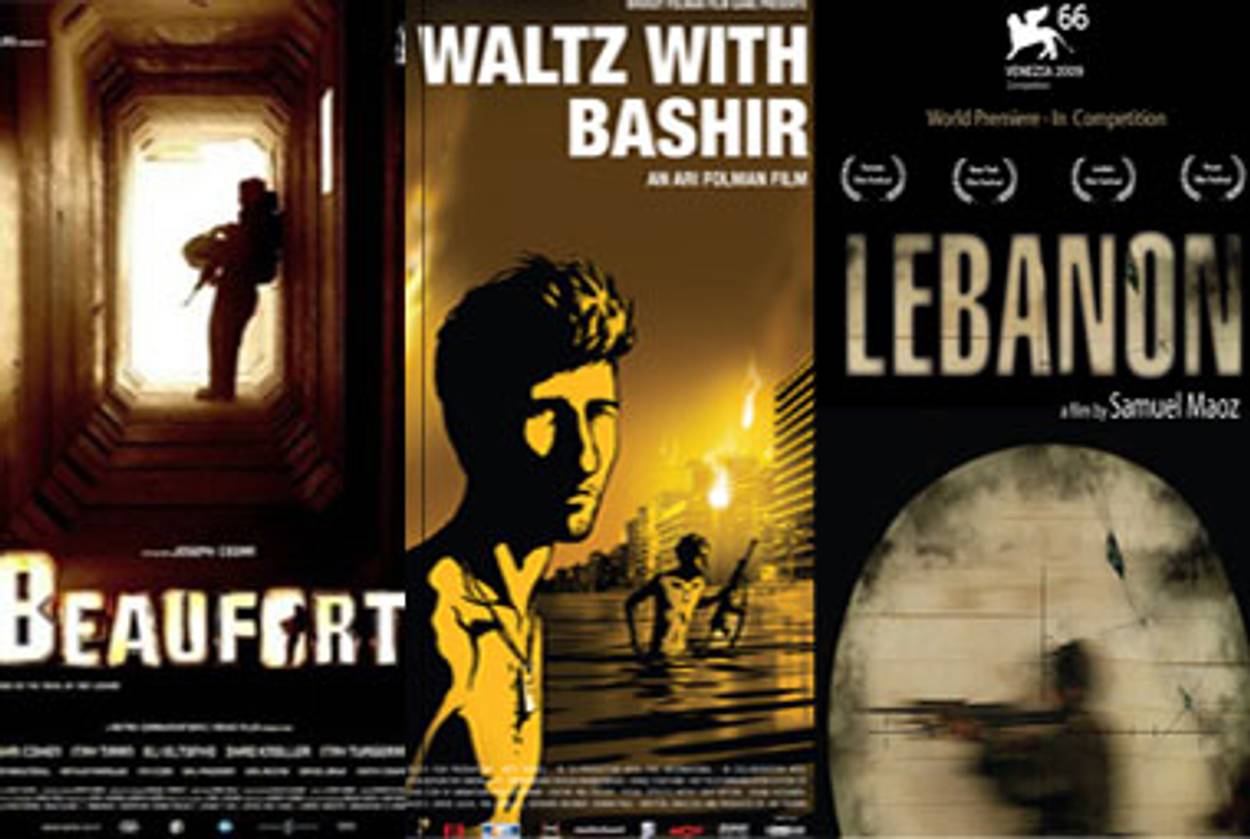War Movies
Samuel Maoz’s ‘Lebanon’ is the latest of three recent films about the 1982 Lebanon war




Does art imitate life, or does life imitate art? Sometimes, it’s a little bit of both: in the summer of 2006, Israel invaded Lebanon for the second time, and every year since, Israeli filmmakers have replied with films that are sharply critical of their government’s prosecution of its first war, in 1982, and subsequent 18-year occupation of a border zone within its northern neighbor. But each part of the resulting trilogy—Joseph Cedar’s Beaufort, Ari Folman’s Waltz With Bashir, and now Samuel Maoz’ Lebanon, playing this week at the New York Film Festival—originated years, or even decades, before the latest round of hostilities broke out, and all three were already in various stages of production when bombs began falling on Beirut three years ago.
“Everything can burst here tomorrow morning, and you just never know,” said Katriel Schory, executive director of the Israel Film Fund, a government-backed nonprofit that provided financing to both Folman and Maoz. “You cannot say the Second Lebanon War triggered these projects—it was a sheer coincidence.” And, he insisted, there was no master plan, just a desire to let a generation of filmmakers who had all served in the first, controversial Lebanon war—what Maoz calls the “Lebanon generation”—explore the lasting effects of combat on Israel’s young.
“What isn’t a coincidence is that we are all obsessed with this war,” said Amy Kronish, the former curator of Jewish and Israeli film at the Jerusalem Cinematheque. “But the film fund’s policy is to fund every feature film, if possible, that’s worth funding—they won’t say to a director, we had a film about this already, we won’t fund you.”
Theoretically, all three films could have come out at the same time. Cedar, a former paratrooper, and won financing in early 2006 from the Rabinovich Foundation for the Arts, another government-sponsored film fund, and wrapped in June of that year, weeks before the start of the 34-day second invasion. The film, which Cedar began writing while sitting in a military jail after refusing to do reserve duty, captures the final days of the occupation of an ancient fortress in southern Lebanon, just before IDF troops pulled out in 2000. Folman, a writer for the Israeli version of In Treatment, began his script for Bashir around the time of the pullout, after he requested early release from his reserve duty as a writer for IDF safety-instruction movies on the grounds that he needed therapy for PTSD stemming from his experience at the front in 1982. In the spring of 2006, he presented Schory with a 10-minute pilot for an animated film exploring his struggle to remember what exactly he did during the massacre at Sabra and Shatila, and released his film last year, just ahead of the Gaza invasion, triggering a heated national debate about the nature of responsibility and memory.
Maoz, a production designer and cinematographer who made his living for years shooting music videos and commercials, wrote his screenplay in a four-week burst in 2006. “I said to myself, you are over 40 and you need to do something with yourself—you are not a young director, and it’s now or never,” Maoz said in an interview last week. He began shooting in 2007, but completion of the film was delayed after the death of one of his producers. Chronologically, his movie belongs at the beginning: it describes the experience of four soldiers manning a tank on June 6, 1982, the first day of the first Lebanon invasion. Set entirely inside the claustrophobic metal walls of the machine, it captures the narrow experience of soldiers whose only view on the carnage is through the sight of a scope—cracked by a missile, for good measure—and who wind up having to bear the brunt of making life-or-death decisions while their feckless commanders sit considering abstractions in safe war rooms, far away.
Now, Maoz—who once told Variety that he watched the news coverage of the second Lebanon War with the uneasy sense that they were filming his script—bears the burden of being in the shadow of his compatriots. Both Beaufort and Waltz with Bashir were huge successes both domestically and abroad, garnering laurels at international film festivals along with consecutive nominations for the best foreign-language Oscars, Israel’s first since the early 1980s. (Folman, who lost the Academy Award race to a Japanese film, won Israel’s first Golden Globe.) “If they’d come out in the same year, maybe one would have succeeded at the expense of the others,” Cedar said.
Lebanon, which is set for theatrical release in America early next year, won the top prize last month at the Venice film festival, but was edged out for best picture at Israel’s Ophir awards, which means Maoz won’t have a shot at a foreign-language Oscar statuette. “In the beginning I thought it was bad luck to be number three,” said Maoz. “But I know that millions of people will see it, and I don’t have reasons to complain.”
Related:
Time of Favor [Tablet]
Fortress of Solitude [Tablet]
Soldier’s Story [Tablet]
Allison Hoffman is a senior editor at Tablet Magazine. Her Twitter feed is @allisont_dc.
Allison Hoffman is a senior editor at Tablet Magazine. Her Twitter feed is @allisont_dc.